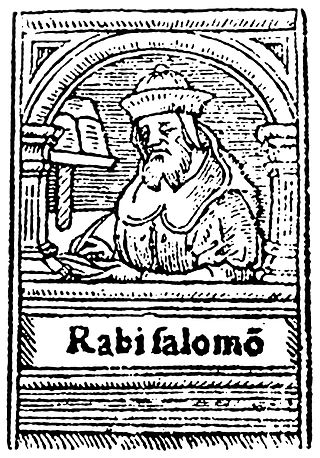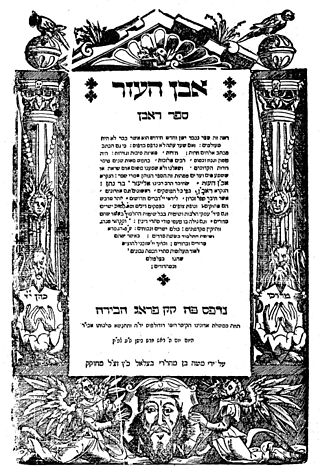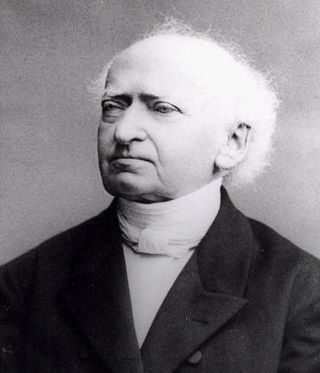Related Research Articles
The Book of Joel is a Jewish prophetic text containing a series of "divine announcements". The first line attributes authorship to "Joel the son of Pethuel". It forms part of the Book of the twelve minor prophets or the Nevi'im ("Prophets") in the Hebrew Bible, and is a book in its own right in the Christian Old Testament. In the New Testament, his prophecy of the outpouring of God's Holy Spirit upon all people was notably quoted by Saint Peter in his Pentecost sermon.

Shlomo Yitzchaki, commonly known by the acronym Rashi, was a French rabbi who authored comprehensive commentaries on the Talmud and Hebrew Bible.
ArtScroll is an imprint of translations, books and commentaries from an Orthodox Jewish perspective published by Mesorah Publications, Ltd., a publishing company based in Rahway, New Jersey. Rabbi Nosson Scherman is the general editor.

Abraham ben Meir Ibn Ezra was one of the most distinguished Jewish biblical commentators and philosophers of the Middle Ages. He was born in Tudela, Taifa of Zaragoza.

Eliezer ben Nathan of Mainz (1090–1170), or Ra'avan, was a halakist and liturgical poet. As an early Rishon, he was a contemporary of the Rashbam and Rabbeinu Tam, and one of the earliest of the Tosafists. He was the son-in-law of Eliakim b. Joseph of Mainz, a fellow student of Rashi. Through his four daughters Eliezer became the ancestor of several learned families which exerted a great influence upon religious life in the subsequent centuries. One of his great-grandsons was Asher b. Jehiel (ROSH), father of R. Jacob, author of the Ṭurim.

Jacob ben Meir, best known as Rabbeinu Tam, was one of the most renowned Ashkenazi Jewish rabbis and leading French Tosafists, a leading halakhic authority in his generation, and a grandson of Rashi. Known as "Rabbeinu", he acquired the Hebrew suffix "Tam" meaning straightforward; it was originally used in the Book of Genesis to describe his biblical namesake, Jacob.

Amos was one of the Twelve Minor Prophets of the Hebrew Bible and Christian Old Testament. According to the Bible, Amos was the older contemporary of Hosea and Isaiah and was active c. 760–755 BC during the rule of kings Jeroboam II of Israel and Uzziah of Kingdom of Judah and is portrayed as being from the southern Kingdom of Judah yet preaching in the northern Kingdom of Israel (Samaria). The prophet is characterized as speaking against an increased disparity between the wealthy and the poor with themes of justice, God's omnipotence, and divine judgment. The Book of Amos is attributed to him. In recent years, scholars have grown more skeptical of the Book of Amos' presentation of Amos' biography and background.

David Kimhi (1160–1235), also known by the Hebrew acronym as the RaDaK (רַדָּ״ק), was a medieval rabbi, biblical commentator, philosopher, and grammarian.
Samuel ben Meir, after his death known as the "Rashbam", a Hebrew acronym for RAbbi SHmuel Ben Meir, was a leading French Tosafist and grandson of Shlomo Yitzhaki, "Rashi".

A Mikraot Gedolot, often called a "Rabbinic Bible" in English, is an edition of the Hebrew Bible that generally includes three distinct elements:
Rabbi Moses ben Jacob of Coucy, also known as Moses Mikkotsi, was a French Tosafist and authority on Halakha. He is best known as the author of one of the earliest codifications of Halakha, the Sefer Mitzvot Gadol.

Franz Delitzsch was a German Lutheran theologian and Hebraist. Delitzsch wrote many commentaries on books of the Bible, Jewish antiquities, Biblical psychology, as well as a history of Jewish poetry, and works of Christian apologetics. Today, Delitzsch is best known for his translation of the New Testament into Hebrew (1877), and his series of commentaries on the Old Testament published with Carl Friedrich Keil.
Tobiah ben Eliezer was a Talmudist and poet of the 11th century, author of Lekach Tov or Pesikta Zutarta, a midrashic commentary on the Pentateuch and the Five Megillot.
Peshat is one of the two classic methods of Jewish biblical exegesis, the other being Derash. While Peshat is commonly defined as referring to the surface or literal (direct) meaning of a text, or "the plain literal meaning of the verse, the meaning which its author intended to convey", numerous scholars and rabbis have debated this for centuries, giving Peshat many uses and definitions.
Isaac ben Meir, also known as the Rivam after his Hebrew acronym, was a French rabbi and one of the Baalei Tosafos.
Isaiah di Trani ben Mali (the Elder) (c. 1180 – c. 1250) (Hebrew: ישעיה בן מאלי הזקן דטראני), better known as the RID, was a prominent Italian Talmudist.
Jewish commentaries on the Bible are biblical commentaries of the Hebrew Bible from a Jewish perspective. Translations into Aramaic and English, and some universally accepted Jewish commentaries with notes on their method of approach and also some modern translations into English with notes are listed.

The Baraita on the Thirty-two Rules or Baraita of R. Eliezer ben Jose ha-Gelili is a baraita giving 32 hermeneutic rules, or middot, for interpreting the Bible. As of when the Jewish Encyclopedia was published in 1901–1906, it was thought to no longer exist except in references by later authorities. However, it was discovered in 1933 by H. G. Enelow, who published it in his "Mishnat Rabbi Eliezer," and in 1947 it was published again in Margaliot's edition of Midrash Hagadol to Genesis.
Joseph ben Simeon Kara, also known as Mahari Kara, was a French Bible exegete who was born and lived in Troyes.
References
- 1 2
 One or more of the preceding sentences incorporates text from a publication now in the public domain : Singer, Isidore; et al., eds. (1901–1906). "ELIEZER OF BEAUGENCY". The Jewish Encyclopedia . New York: Funk & Wagnalls. Retrieved Aug 16, 2018.
One or more of the preceding sentences incorporates text from a publication now in the public domain : Singer, Isidore; et al., eds. (1901–1906). "ELIEZER OF BEAUGENCY". The Jewish Encyclopedia . New York: Funk & Wagnalls. Retrieved Aug 16, 2018. - ↑ "Eliezer of Beaugency | Encyclopedia.com".
- ↑ ed. Nutt, 1879
- ↑ ed. S. Poznanski, in "Ha-Goren," iii. 98-127
- ↑ Neubauer, "Cat. Bodl. Hebr. MSS." No. 1465
- ↑ Harris, Robert A. (2018). Rabbi Eliezer of Beaugency, Commentaries on Amos and Jonah (With Selections from Isaiah and Ezekiel). Medieval Institute Publications. doi:10.2307/j.ctvvncgw. ISBN 9781580443036. JSTOR j.ctvvncgw.
- ↑ Czuker Edition Mikra'os Gedolos Nevi'im Trei Asar. Artscroll Mesorah. 2017. ISBN 9781422619063.